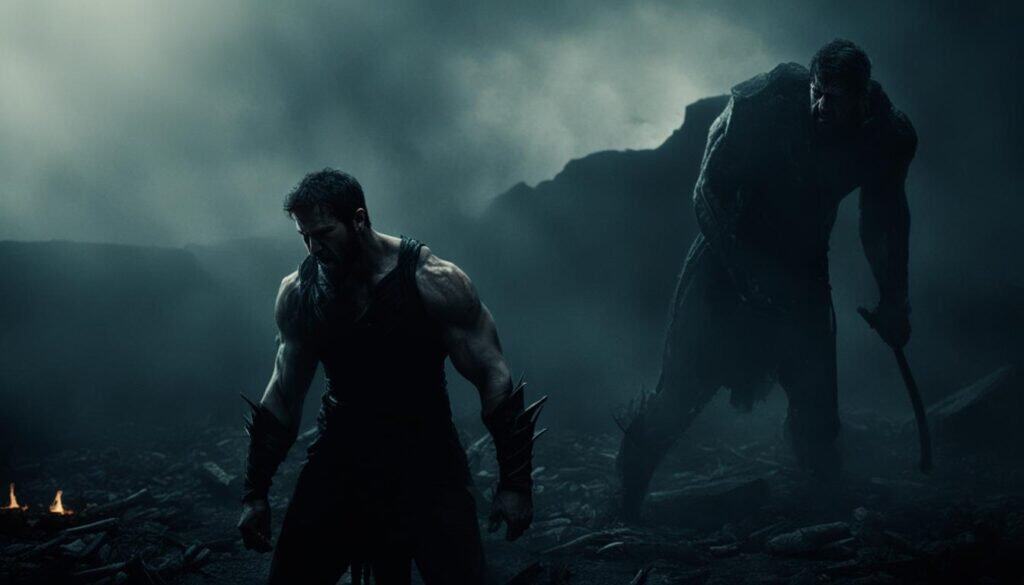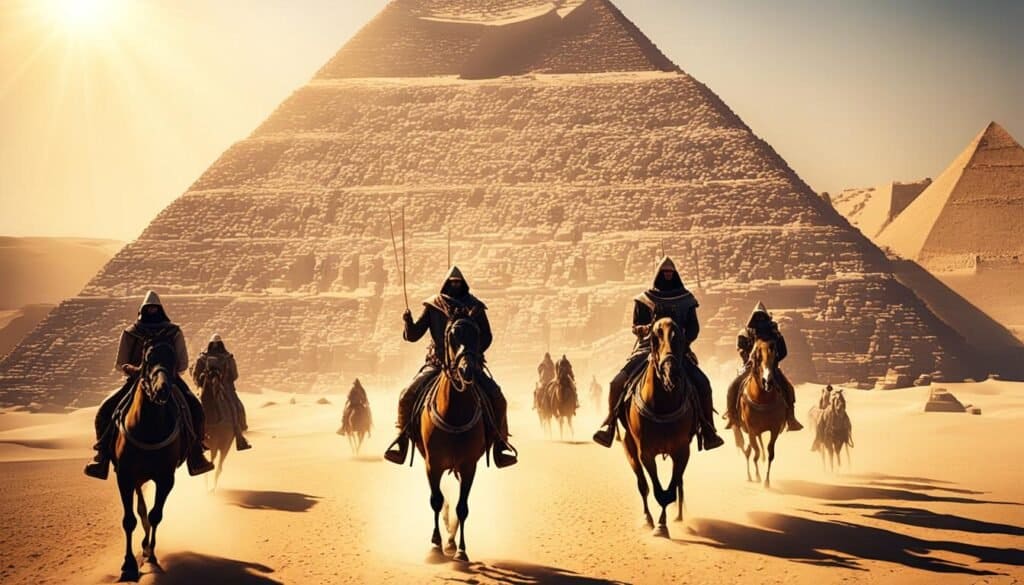Welcome to our journey through the ethical challenges in Genesis. These moral dilemmas have sparked debate for ages. They touch on our values, beliefs, and understanding of justice, divine and otherwise.
Genesis leads us through tough ethical questions. It makes us think about God’s interference in our lives. We also ponder on the ethics of wiping out entire communities.
Ready to face these hard truths in Genesis? Let’s explore its ethical puzzles deeply. We’ll look into complex moral questions together.
Key Takeaways:
- Genesis poses tough ethical questions about morality and justice.
- These questions touch on autonomy, punishment, and divine choices.
- This exploration helps us understand our own values better.
- It encourages deeper talks about what’s right and wrong.
- Ultimately, Genesis forces us to confront relevant moral issues today.
The Tree of Knowledge: God’s Right to Limit Autonomy
From the beginning, Genesis talks about God forbidding humans to eat from the tree of knowledge. This choice by God makes us think about whether God has the right to restrict our actions and what it means for our freedom to choose.
In the story, Adam and Eve were given everything in the Garden, except knowledge from one tree. God told them not to eat from the tree of knowledge. He warned them about the bad things that might happen if they didn’t listen.
This act of setting limits by God is a big ethical question for us. Some say that because God made everything, He can decide the rules. This rule about the tree of knowledge shows if we can trust and follow God, acknowledging His greater wisdom.
Others wonder if this rule is fair. Why dangle a temptation in front of them if you don’t want them to fall for it? It might feel like God is taking away their freedom to choose and learn.
“And the Lord God commanded the man, ‘You are free to eat from any tree in the garden; but you must not eat from the tree of the knowledge of good and evil, for when you eat from it you will certainly die.'” – Genesis 2:16-17
This debate brings up deep questions around freedom and obeying an all-powerful God. Is our freedom real when God makes certain demands?
Looking at it from a religious view, some say God didn’t limit us but rather protected us. He kept us from knowing everything, which also meant avoiding certain troubles and moral tough spots.
But this brings up another tough question about free will. If real freedom means choosing without outside pushing, then Adam and Eve weren’t given full freedom.
We may never fully solve the puzzle of God’s rule over our freedom. But digging into this moral problem makes us think hard about God’s authority and our right to make our own choices. It also pushes us to think about what happens when we want to know more than we should.
Cain and Abel: The Harshness of Cain’s Punishment
In the story of Cain and Abel, we face a tough issue: What’s the right punishment for killing someone?
Cain kills Abel, his own brother. This makes us consider what the fair punishment should be for such a big crime. It also makes us think about what real justice might mean.
“Then the Lord said to Cain, ‘Where is Abel your brother?’ He said, ‘I do not know; am I my brother’s keeper?’ And the Lord said, ‘What have you done? The voice of your brother’s blood is crying to me from the ground. And now you are cursed from the ground, which has opened its mouth to receive your brother’s blood from your hand. When you work the ground, it shall no longer yield to you its strength. You shall be a fugitive and a wanderer on the earth.'”
Genesis 4:9-12 (ESV)
The punishment Cain gets is very tough. God makes it so the land won’t grow food for Cain anymore. Cain also has to keep moving, never finding a real place to call home. This punishment shows how serious murder is and how it messes up the world.
When we look closer, we see that God actually talks to Cain before punishing him. God gives Cain a chance to understand what he did wrong and to change. This shows that even after a serious crime, there can be a chance to make it right.
So, Cain’s punishment might not just be about his crime. Perhaps it’s about not wanting to make things right. This makes us think about the role of regret and change in punishment.
The story of Cain and Abel makes us think about fairness and our own actions. It reminds us that there’s more to justice than we might see at first. It’s about all kinds of moral issues and being responsible.
Biblical Perspective: Lessons on Justice and Mercy
The Cain and Abel story tells us a lot about justice and mercy from a Bible point of view. Hard punishments remind us our choices matter. Cain’s story is a warning about what can happen when we make bad choices.
But, God also shows mercy. After Cain’s terrible act, God talks to him. This shows there’s always a chance to turn things around, to find hope again.
Thinking about Cain’s punishment makes us reflect on our actions too. It shows that understanding right from wrong is hard. But with thought and care, we can learn to do better.

The picture shows the guilt Cain feels after killing Abel. It’s a powerful image of the story’s moral challenges. It helps us see the deep ethical questions in this part of the Bible.
The Great Flood: Justifying the Destruction of Humanity
The story of the Great Flood in Genesis is very famous. It talks about God’s decision to wash the world of everyone except Noah’s family. This makes us think about whether it was right to destroy all of humanity. It also brings up questions on how God reacts to sin.
The Devastation and Its Implications
The Great Flood wiped out almost all of humanity. Only Noah and his family survived by building an ark. The huge loss of life makes us think about the moral side of destroying a civilization.
In this story, the world was full of evil and sin. God used the flood as a way to start over. Noah and his family were the chosen ones to help humanity begin again.
The Importance of Divine Justice
The Great Flood makes us question if such a big response to sin was fair. But looking at it from the perspective of God’s justice, we see a different side. It was a way to make the world right again, to bring back order and righteousness.
The flood showed that evil won’t get away with a punishment. It reminds us that all acts, good or bad, have outcomes. Divine justice, even if it means great destruction, will stand.
“The Great Flood showcases the importance of divine justice and the consequences of human actions.”
The Symbolism of the Flood
The Great Flood carries a deep meaning. It shows both God’s anger and the chance for a new and better start. It is more than just a story of great destruction.
By having Noah and his family survive, it becomes a story of hope. It tells us that even after judgment, there can be redemption and a new beginning.
Tower of Babel: Suppression of Ambition and Unity
The Tower of Babel story from Genesis poses a challenge. It makes us think about how human ambition and unity are sometimes suppressed. This tale sheds light on the relationship between divine order and our dreams.
In the story, people in Babel built a huge tower to reach the sky and gain fame. But, God saw this and decided to mix up their languages. This made them unable to work together. So, they stopped building and scattered all over the world.
“Come, let us go down and confuse their language so they will not understand each other.” – Genesis 11:7
This story brings up important questions. Like, did God have to stop them from building the tower? Did this help or hurt human progress? Was it needed to keep things in order by God’s plan?
On one side, stopping human ambition seems bad for progress. It might limit new ideas, stop exploration, and slow down teamwork. But, the Bible sees this as God’s way to keep balance in the world. Spreading people out could prevent power from concentrating too much.
The story is a warning about being too ambitious and forgetting our place in a bigger plan. It makes us think about balancing our dreams with what a higher power sees fit.
Lessons from the Tower of Babel
1. Humility: This story warns against too much ambition leading to pride. It tells us to be humble and remember that there’s a bigger plan.
2. Unity in diversity: When the people spread out, it shows the value of different cultures working together. It’s a lesson in unity and respect for others.
3. Divine order: The Tower of Babel lesson is that we should follow the plan set by a higher power. It teaches us to check our goals against what’s intended for us.
Reflecting on the Tower of Babel helps us understand God’s plan and our place in it. It’s a lesson in following our dreams while staying aware of a greater design.
Abraham and Isaac: Testing Faith through the Sacrifice of a Child
The story of Abraham being asked to sacrifice his son Isaac brings up deep questions. This story in Genesis makes us think hard. It asks us to consider the ethics of a test of faith involving a child’s sacrifice.
Abraham, the great father of many nations, was told by God to sacrifice Isaac. This was a big test for Abraham. It showed his strong, unwavering faith and devotion. The story highlights the hard choices people must sometimes make.
Abraham’s faith is tested greatly on the journey to Mount Moriah. The thought of sacrificing Isaac weighs heavily on Abraham. He struggles inside, caught between his love for his son and his loyalty to God. It raises very deep ethical issues.
“By faith, Abraham, when God tested him, offered Isaac as a sacrifice. He who had embraced the promises was about to sacrifice his one and only son.”
Even as Abraham was about to sacrifice Isaac, he showed his deep trust in God. His obedience wasn’t blind; it came from his strong faith. This shows how complex the relationship between faith, action, and ethics can be.
The Abraham and Isaac story makes us think about morality. It challenges the nature of divine tests, especially when they could lead to innocent suffering. It makes us question our ideas about religious dedication and love for family.
Testing Faith and the Complexity of Ethical Implications
The Abraham and Isaac story deeply challenges us ethically. It asks us to reconsider the morality of faith tests that involve child sacrifice. Is it right for a God to test faith this way?
This ethical puzzle also raises issues about the limits of religious faith. It makes us think about our duties to loved ones. The story pushes us to think about how we make moral decisions within our beliefs.
The tale of Abraham and Isaac might be tough but it’s a chance for us to think. It helps us look at our own values and beliefs. By exploring its ethical dilemmas, we’re encouraged to talk and think about faith, obedience, and morals.
Jacob and Esau: Deception and Divine Preference
The book of Genesis tells the story of two brothers, Jacob and Esau. It makes us think about deceit and whether some people are chosen by a higher power. We’ll look at the ethical issues around Jacob’s deceiving actions and what it means for divine favoritism.
Jacob tricks his brother, Esau, out of his birthright. This birthright was a big deal, as the oldest son usually got it. Jacob tricks Esau into giving it away for a small meal. This makes us ask: is it okay to deceive someone to achieve a higher goal?
“Deception is hard to judge morally. The story about Jacob doesn’t say whether his actions were right or wrong. It just leaves us thinking about what happens when we’re deceitful.”
God told their mom, Rebecca, that Jacob would get the birthright instead of Esau. This goes against what was normally done. It makes us think about whether being chosen by God justifies using deception.

We need to look at Jacob and Esau’s story from a biblical perspective. It helps us understand the complex issues around our actions, divine guidance, and morality. Looking at Jacob’s deceit and the idea of God picking favorites offers us a chance to explore these themes deeply.
Lessons Learned:
- Deception is always a tricky moral issue, no matter the reason.
- Divine favor makes us question fairness and justice.
- Jacob and Esau’s story urges us to think about the moral implications of our choices and our connection with the divine.
| Ethical Questions | Jacob and Esau |
|---|---|
| Is deception ever justifiable? | Presented as a dilemma through Jacob’s actions |
| Does divine preference imply favoritism? | Showcased by God’s revelation to Rebecca |
| What insights can we gain from biblical narratives? | Engaging with the complex relationship between humans and the divine |
Studying Jacob and Esau’s story makes us think deeply. It challenges our views on deceit, divine favor, and the connection between our choices and God’s plan.
Sodom and Gomorrah: The Justification for Annihilation
The story of Sodom and Gomorrah’s destruction is well-known. These cities were infamous for their sin and evil. Their ruin was a result of the widespread corruption.
This tale makes us think about punishment for sin. It asks if destroying these cities was a fair response to their actions. It leads to questions about divine justice and our own choices.
God often punishes sin in the Bible, showing His dislike for evil. This theme in Genesis tells us the importance of living righteously. It brings out the consequences of sinful lives.
Punishment for Sin
Sodom and Gomorrah were destroyed due to their extreme wickedness. The cities were full of immoral acts like sexual sins and violence. Their evil became too much for God to bear.
By destroying these cities, God showed His love for goodness and fairness. This event warns us about the results of turning away from what’s right.
The Ethical Implications
The severe punishment highlights the scale of sin in those cities. It raises questions about justice and mercy. And it makes us think about the limits of punishment for sin.
Some see the destruction as fair for such serious sins. Others wonder about those who might have been innocent. They also question if there was a chance for them to change.
“The destruction of Sodom and Gomorrah reminds us that God’s justice prevails, even in the face of great sin. It is a cautionary tale that teaches us the importance of leading lives free from immorality.” – Genesis 19:24
The story’s ethical lessons are key. It reminds us of the lasting impact of our choices. We’re urged to live by good values and make right decisions, despite temptations.
In our own ethical battles, Sodom and Gomorrah’s story warns us about the dangers of sin. It encourages us to choose what is right and stay true to goodness and honesty.

| Sodom | Gomorrah |
|---|---|
| Widespread sin and corruption | Rampant immorality |
| God’s punishment for sin | Balance between justice and mercy |
| Consequences of straying from righteousness | Lessons learned about leading ethical lives |
Joseph and His Brothers: Revenge Orchestrated by God
In the tale of Joseph and his siblings, a complex ethical dilemma emerges. It involves God’s orchestration of a revenge plot. Joseph, sold into slavery by his envious brothers, later becomes powerful in Egypt. He is given the chance to get even with his brothers, who come to him for aid during a famine. This story makes us think deeply about revenge’s moral aspects, especially when a divine power is behind it.
Revenge is a mix of emotions, mostly coming from pain and betrayal. It’s easy to want to get back at those who hurt us. Yet, seeking revenge can start cycles of violence and hate. This brings more harm than good and raises moral questions.
The pursuit of revenge can cloud our judgment and fuel destructive behavior.
Joseph faces a crucial decision. He must choose between seeking revenge on his brothers, using his power, or showing them forgiveness and peace. Joseph’s choice of revenge eventually leads to his brother’s regret and a reunion. Still, it sparks ethical debates about his decisions.
- Divine intervention: The narrative hints that God uses this revenge to test Joseph and achieve a positive outcome. This story explores the divine role in human actions and our duty to follow divine plans.
- Moral responsibility: Revenge makes us ponder over our moral duties. Should we take revenge or leave justice to a higher power? Joseph’s tale provokes thought on these matters and the results of our choices.
- Forgiveness versus revenge: Joseph’s forgiveness towards his brothers showcases the power of letting go and showing kindness. It calls for moving beyond revenge and opting for forgiveness to stop hatred and sorrow.
Contemplating Joseph’s story highlights the snares in revenge and the ethical queries in divine acts. This narrative leads us to question revenge’s true effects on creating good.
Let us keep exploring Genesis. We delve into the ethical dilemmas and the impacts on our view of justice and morality, brought by these biblical tales.
Slavery in Egypt: Questions of Condoning the Practice
The story of slavery in Egypt, found in Genesis, prompts us to think deeper. It talks about how the Israelites, the chosen people, faced slavery. This opens up a discussion about whether endorsing slavery reflects positively on divine teachings.
In Egypt, the Israelites were enslaved, as told in Exodus. This story brings up the issue of a chosen group enduring slavery for generations. It makes us think hard about why a divine force would allow such a thing.
The ethical challenge here is big. The Bible teaches us to have empathy and be kind, which doesn’t match with slavery. But, it also shows slavery being allowed in society. This contradiction is hard to ignore.
Studying this topic helps us understand the tensions in these stories better.
The Bible doesn’t outright say slavery is okay. It tells stories of people trying to break free from it, like the Exodus tale. In this story, God helps the Israelites escape their chains, showing a desire for justice and freedom.
Looking at this issue historically, we see slavery was common back then. The Bible acknowledges this but also pushes against such oppressive systems. It tells stories that support freeing those who are enslaved.
To truly understand slavery in ancient Egypt, we need to look at it from different angles. We need to see how it fits into the Bible’s teachings, its historical setting, and its moral message. This way, we can explore the topic fully and learn from it.
Relevant passages:
- Exodus 1:8-14 – The Israelites’ enslavement in Egypt
- Exodus 5:1-23 – Moses’ confrontation with Pharaoh regarding the Israelites’ freedom
- Exodus 20:2-17 – The Ten Commandments, including the commandment against coveting a neighbor’s property, which aligns with the rejection of slavery as an institution
| Pros | Cons |
|---|---|
|
|

How Do the Ethical Dilemmas in Genesis Relate to the Hard Questions It Poses?
The ethical dilemmas in Genesis challenge readers to confront difficult moral questions about human nature, free will, and divine justice. As individuals grapple with these narratives, they find themselves wrestling with genesis’ tough questions, prompting deeper reflection on their own beliefs and the complexities of morality in a flawed world.
Original Sin: Accountability for Future Generations
The idea of original sin from Genesis hits deep. It makes us think about whether it’s fair to hold future people responsible for Adam and Eve’s actions. This debate on passing down sin challenges us to understand the morals of our history.
This concept means all who follow are affected by ancient choices. It makes us question the fairness of linking future people to old sins. But it also makes us see that our actions resonate across generations.
Some say it’s not fair to blame us for sins we didn’t commit. Others see it as a lesson in our common human weaknesses and a call to join in redemption. Thinking about future accountability shows how our choices affect those who come after us.
Discussing original sin forces us to balance fairness and kindness. We question what it means for each of us and for everyone together. These conversations aim to lead to a future that’s fairer and wiser for all.
Affiliate Disclosure: "As an Amazon Associate I earn from qualifying purchases made from links in this post. We are a participant in the Amazon Services LLC Associates Program, an affiliate advertising program designed to provide a means for us to earn fees by linking to Amazon.com."

